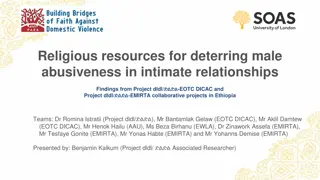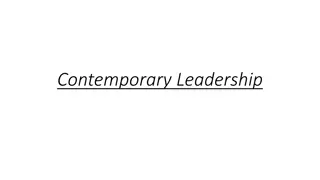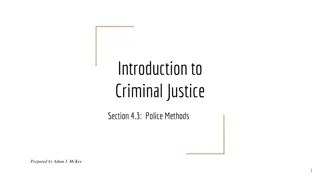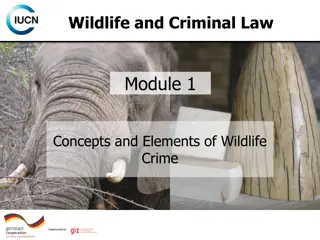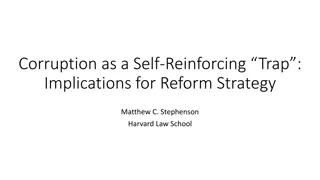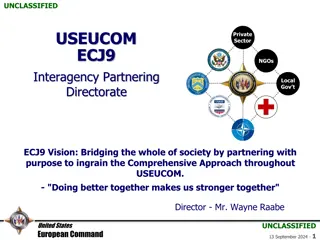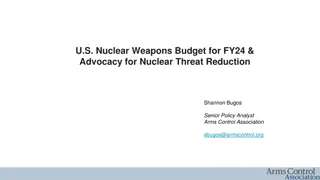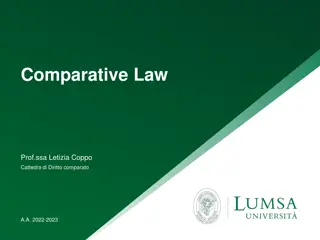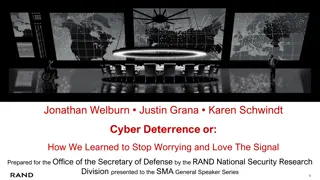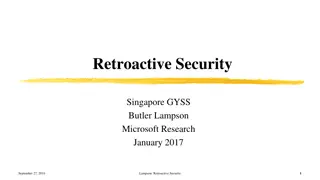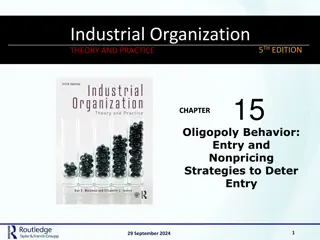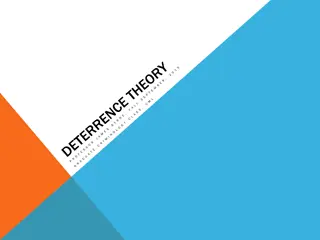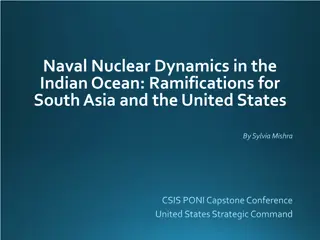Religious Resources for Deterrence of Male Abusiveness in Intimate Relationships
This research project, conducted in collaboration with various organizations and experts, delves into the role of religion in deterring male abusiveness within intimate relationships. Findings suggest that religion can serve as a deterrent at both individual and normative levels, emphasizing faith-b
0 views • 9 slides
Understanding Trust in Contemporary Leadership
Trust is the foundation of effective leadership, comprising elements like integrity, competence, consistency, loyalty, and openness. Trust plays a crucial role in leadership, impacting team performance and cooperation. Different types of trust - deterrence-based, knowledge-based, and identification-
0 views • 9 slides
Evolution of Police Methods in Criminal Justice
Traditional police methods in America primarily involved patrol officers and investigators, with a focus on deterrence, crime prevention, and solving crimes. However, proactive policing strategies emerged in the 1990s to address the limitations of traditional methods. Patrol remains a crucial aspect
5 views • 32 slides
Evolution of Punishment: From Brutality to Modern Criminal Justice System
Punishment for crime has evolved over time from brutal public spectacles to more civilized forms of discipline in modern society, reflecting changes in ruling class interests. The Criminal Justice System (CJS) focuses on deterrence, public protection, retribution, and rehabilitation. There has been
1 views • 25 slides
Wildlife Crime and Criminal Law: Understanding Concepts and Elements
Explore the intricate world of wildlife crime and criminal law in this module, covering topics such as defining wildlife crime, compliance approaches, the importance of addressing wildlife crime, motivations behind committing such crimes, and the international and regional dimensions of the issue. G
0 views • 57 slides
Unpacking Self-Reinforcing Corruption Patterns
Delve into the complex dynamics of self-reinforcing corruption cycles and their implications for reform strategies. Explore how widespread corruption weakens deterrence, strengthens individual incentives for corruption, and impacts social norms against corrupt practices.
0 views • 45 slides
Enhancing Security Through Whole-of-Society Approach
United States European Command (USEUCOM) and ECJ9 are working to integrate interagency, private sector, NGOs, and local government partners to strengthen defense, deterrence, and resilience. Their focus is on countering hybrid threats, enhancing interoperability, and promoting full spectrum resilien
0 views • 8 slides
U.S. Nuclear Weapons Budget for FY24 & Advocacy for Nuclear Threat Reduction Overview
The Fiscal Year 2024 budget for U.S. nuclear weapons activities is $56.6 billion, up by 11% from the FY23 request. The budget includes allocations for the Energy Department, Defense Department, and National Nuclear Security Administration for various nuclear weapon delivery systems and warheads. The
0 views • 5 slides
Understanding Comparative Property Law in the Contemporary Legal Landscape
Comparative Property Law explores the common challenges and fundamental questions of contemporary tort law, covering topics such as tort liability, legal positions protected by tort law, criteria for attributing liability, compensatory, deterrence, and punitive functions of tort law, and more. The i
0 views • 37 slides
Enhancing Cyber Deterrence Strategies in the Modern Age
The current state of cyberspace reveals persistent threats targeting the U.S., emphasizing the need for effective deterrence strategies. Calls for a comprehensive cyber deterrence framework have been made by key committees, highlighting the urgency to develop response options, denial strategies, and
0 views • 33 slides
Retroactive Security Approach by Butler Lampson in January 2017
Retroactive security proposed by Butler Lampson addresses the limitations of traditional access control mechanisms. Emphasizing a focus on events that have actually occurred, this approach aims to improve real-world security by enabling accountability, blame assignment, and selective undo capabiliti
0 views • 20 slides
Oligopoly Behavior: Excess Capacity Models and Entry Deterrence Strategies
Examine the concept of excess capacity models in oligopoly behavior, where a monopolist may strategically deter entry by either building excess capacity or expanding current production facilities in response to potential entrants. Explore scenarios involving sunk costs, marginal costs, pricing strat
0 views • 37 slides
Future Growth and Economic Impacts of GBSD Program in Northern Utah
Ground Based Strategic Deterrence program is set to bring substantial growth opportunities to Northern Utah, with an influx of jobs, economic impacts, and community development. The program's current situation at Hill AFB shows stability and promising future prospects, with significant contracts awa
0 views • 12 slides
Understanding Deterrence Theory and Classical Criminology
The content provides an overview of deterrence theory, focusing on key figures, assumptions, general and specific deterrence, research, and policy implications. It also delves into classical criminology, discussing key figures like Jeremy Bentham and Cesare Beccaria, concepts such as felicity calcul
0 views • 21 slides
Understanding the Aims of Punishment and Evaluating Deterrence as an Effective Aim
Explore the aims of punishment and the reasons behind punishing criminals in different ways through a series of tasks. Match descriptions to aims, identify and explain key aims of punishment, and evaluate the effectiveness of deterrence as a primary aim. Provide reasoned arguments, consider religiou
0 views • 4 slides
Understanding Sequential Games in Game Theory
Explore the concept of sequential games in game theory through an entry deterrence game involving an incumbent monopolist and a potential entrant. The game tree depicts various outcomes based on choices made by players, leading to discussions on Nash Equilibrium, credible commitments, and backward i
0 views • 17 slides
Naval Nuclear Dynamics in the Indian Ocean: Implications for South Asia and the United States
Delve into the complexities of naval nuclear dynamics in the Indian Ocean, exploring strategic developments, India's sea-based deterrence efforts, and the geopolitical implications for South Asia and the United States. Assess the simultaneous rise of China and India, the influence of major chokepoin
0 views • 14 slides
